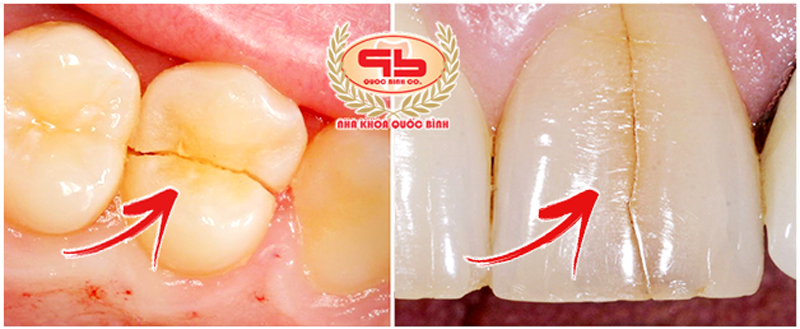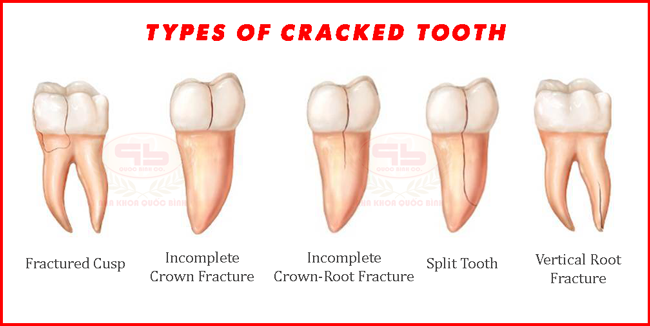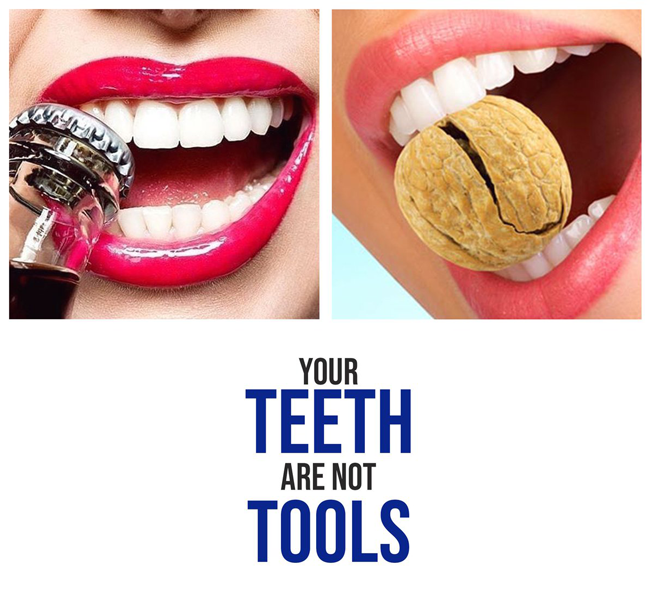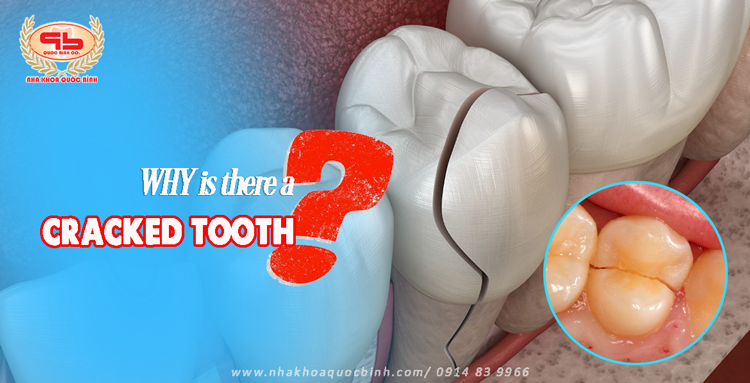Cracked tooth is a condition of damaged teeth that many dental experts warn about. This condition not only affects aesthetics, but also causes harm to oral health. Risks such as tooth sensitivity, pain, looseness or even tooth loss are possible. So why do teeth crack?

Cracked teeth are identified when there are longitudinal or transverse cracks on the crown or root of the tooth.
@ Some of the common causes of cracked teeth are as follows:
- Use your teeth to bite or chew on materials or foods that are too hard.
- Having an accident that causes a strong impact on the teeth while traveling on the road, or playing sports, fighting martial arts …
- Harmful habits such as uncontrolled teeth grinding during sleep
- Congenital weak enamel health.
- Sudden change in food temperature during eating combined with the impact force when eating strong chewing.
- As people age, their oral health also weakens and teeth are more prone to chipping.
- Non-standard fillings are easy to crack when under pressure.
@ Several types of cracks in teeth have been identified:
- Longitudinal crack on the crown in the vertical direction.
- Horizontal crown fracture
- The tooth is cracked in half from the crown to the root
- Crack at the root of the tooth
- Longitudinal crack due to previous filling.

So can cracked tooth be treated to heal on its own?
The tooth structure consists of three specific parts: enamel, dentin, and dental pulp.
Cracks in the crown usually first appear in the enamel. And this is a mineral layer, not a living cell, so it will not be able to heal itself.
Cracks that are not treated early will often progress to wider and longer cracks. Then the tooth will be at risk of being broken in half, or broken horizontally; Or bacteria enter the crack and cause an infection of the tooth. From there, it seriously affects the tooth pulp, jaw bone …
Therefore, once you detect an abnormality on your teeth, you should not treat it yourself at home, but need to see a dentist immediately.
@ Some notes to help detect cracked tooth:
- Cracks in the crown of the tooth can be detected through a routine examination every 6 months
- Or detected by a dentist through an X-ray when examining another medical condition.
- Or when you find that your teeth are sensitive for a long time, even painful when chewing; Combined with the gum area around the sore tooth that shows red swelling … then this may be the first sign pointing to you.
Is there currently a solution to handle cracked tooth?
Regardless of the disease, it will depend on the actual situation that there is an appropriate treatment solution.
Dentists can apply some of the following methods:
@ Fillings:
This is a quick and easy solution, but only applies to a few situations.
The dentist will use a composite material to cover the crack, for covering the damage.
However, this material is easily stained after a period of use, so it will cause the tooth surface to become yellow or patchy.
Besides, the durability of the filling is not high, it is easy to peel off during chewing.
Therefore, the solution of filling teeth is still not optimal.
@ Making porcelain crown / Porcelain veneers
Unlike temporary fillings, porcelain crowns are very durable and perfect in both aesthetics. However, depending on the condition of the cracked tooth, the dentist will treat it accordingly.
If the crack is only in the enamel on the crown and the root is not damaged, then applying this solution is great.
As for the situation where the tooth has been split in half, or broken horizontally, the crown is lost; Then, it is better to treat by extracting teeth and implanting teeth, or making porcelain bridges.
Note that in case the tooth is cracked due to trauma, it can cause inflammation of the tooth root and jawbone area. Therefore, it is necessary to combine treatment before proceeding to restore new teeth.
A really strong tooth is always a valuable asset worth protecting
In order not to regret when your teeth are damaged, you should pay more attention to the care and maintenance of your real teeth.
- Do not use your teeth to bite or chew hard objects (biting bones, opening bottles, chewing ice cubes, etc.)
- Having a reasonable diet, proper dental hygiene care.
- Always keep a relaxed, positive mind, to limit the risk of teeth grinding while sleeping.
- And get in the habit of visiting the dentist regularly. Helps detect and treat oral diseases early so as not to cause complications later.

During the time of social distancing, the clinic temporarily stopped accepting patients widely. However, the dentist still has doctors on duty, and receives and handles urgent treatment cases that cannot be delayed.
QUOC BINH DENTAL CLINIC IN VUNG TAU CITY
Chief Doctor: Dr. PHAN QUOC BINH
Facility 1: 19 Pham Hong Thai, Ward 7, Vung Tau City.
(Closed every Sunday)
☎️ 09148399 66/ (0254) 383 99 66
Facility 2: 28 Le Loi, Ward 4, Vung Tau City.
(Closed every Saturday)
☎️ (0254) 381 83 18
Facility 3: 649 Truong Cong Dinh
, Ward 7, Vung Tau City
Doctor in charge: Dr. NGUYEN HUU CHIEN
️☎️ 0708 649 649
(Closed every Friday)
⏰Working time: 7:30 – 11:30, 14:00 – 20:30
Dental cosmetic fanpage: https://www.facebook.com/nhakhoathammyquocbinh/
Dental general fanpage: https://www.facebook.com/nhakhoaquocbinh/

